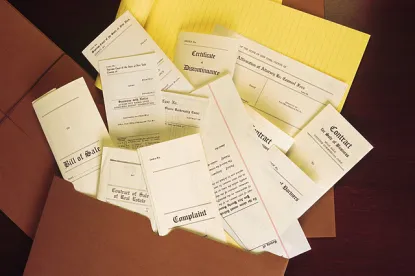Fischer v. Forrest, —F. Supp. 3d—, 2017 WL 773694 (S.D.N.Y. Feb. 28, 2017)
Judge Peck has “once again” issued a “discovery wake-up call,” this time regarding the effects of the 2015 amendments on the rules of discovery and in particular on Rule 34, addressing proper responses to requests for production. Specifically, the court noted that “one change that affects the daily work of every litigator is to Rule 34,” and instructed that “[m]ost lawyers who have not changed their ‘form file’ violate one or more (and often all three)” of the changes to the rule. Those changes require that “responses to discovery requests must”:
-
State grounds for objections with specificity;
-
An objection must state whether any responsive materials are being withheld on the basis of that objection; and
-
Specify the time for production and, if a rolling production, when production will begin and when it will be concluded.
In these related cases, the court concluded that Defendants’ responses to discovery violated the discovery rules, including by failing to comply with the requirements of Rule 34(b) and failing to recognize and appropriately respond to the amendments to Rule 26(b)(1).
Defendants’ amended responses to discovery “containe[d] 17 general objections” including “General Objection No. I” which objected “to the requests to the extent that they call for the disclosure of information that is not relevant to the subject matter of this litigation, nor likely to lead to the discovery of relevant, admissible evidence.” At the end of the general objections, Defendants stated that “[s]ubject to and without waiver of the foregoing general objections which are hereby incorporated by reference into each response, Defendant’s Response to Plaintiff’s Request for Production of Documents are as follows ….” Defendants’ specific objections, two of which the court provided as examples, included objections on the grounds of overbreadth and undue burden and statements that the discovery was “not likely to lead to the discovery of relevant evidence.”
Taking up its analysis, the court proceeded to “count the ways defendants ha[d] violated the Rules”:
First, incorporating all of the General Objections into each response violates Rule 34(b)(2)(B)’s specificity requirement as well as Rule 34(b)(2)(C)’s requirement to indicate whether any responsive materials are withheld on the basis of an objection. General objections should rarely be used after December 1, 2015 unless each such objection applies to each document request (e.g., objecting to produce privileged material).
Second, General Objection I objected on the basis of non-relevance to the “subject matter of this litigation.” (See page 3 above.) The December 1, 2015 amendment to Rule 26(b)(1) limits discovery to material “relevant to any party’s claim or defense ….” Discovery about “subject matter” no longer is permitted. General Objection I also objects that the discovery is not “likely to lead to the discovery of relevant, admissible evidence.” The 2015 amendments deleted that language from Rule 26(b)(1), and lawyers need to remove it from their jargon. See In re Bard IVC Filters Prod. Liab. Litig., 317 F.R.D. 562, 564 (D. Ariz. 2016) (Campbell, D.J.) (“The 2015 amendments thus eliminated the ‘reasonably calculated’ phrase as a definition for the scope of permissible discovery. Despite this clear change, many courts [and lawyers] continue to use the phrase. Old habits die hard. … The test going forward is whether evidence is ‘relevant to any party’s claim or defense,’ not whether it is ‘reasonably calculated to lead to admissible evidence.”’).
Third, the responses to requests 1-2 stating that the requests are “overly broad and unduly burdensome” is meaningless boilerplate. Why is it burdensome? How is it overly broad? This language tells the Court nothing. Indeed, even before the December 1, 2015 rules amendments, judicial decisions criticized such boilerplate objections. See, e.g., Mancia v. Mayflower Textile Servs. Co., 253 F.R.D. 354, 358 (D. Md. 2008) (Grimm, M.J.) (“[B]oilierplate objections that a request for discovery is ‘over[broad] and unduly burdensome, and not reasonably calculated to lead to the discovery of material admissible in evidence,’ persist despite a litany of decisions from courts, including this one, that such objections are improper unless based on particularized facts.” (record cite omitted)).
Finally, the responses do not indicate when documents and ESI that defendants are producing will be produced.
The court concluded by ordering Defendants to revise their responses, by instructing “all counsel to learn the now-current Rules and update their ‘form’ files,” and by warning that in future cases before the court, discovery responses that do not comply with Rule 34’s “requirement to state objections with specificity” will constitute a waiver of all objections, except as to privilege.



 />i
/>i

